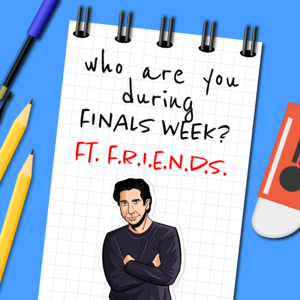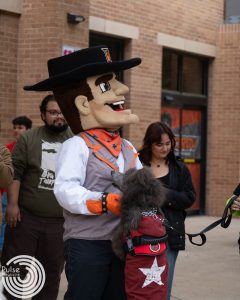Split Decision
By Benjamin Alvarado
Illustration By Daniel Gonzalez Franco
The blood’s sight and taste from his broken nose dazed Pablo Zarate. He did not feel any pain until after the fight when he washed his face in the dressing room and opened his eyes to see a purple grape. Over 12 rounds, the Izquierdasos and derechasos battered his body and face. He did not feel lightheaded until he urinated pure blood. Then he fell asleep in the dressing room, staring at the poster of the great Mexican champion Ruben“El Púas” Olivares.
He knew going into the match that Julio Tavares from Tijuana, Mexico was an outside fighter who relied heavily on jabs, straights, and multiple-punch combinations to keep his distance. Zarate and his trainer, Don Fidel, had studied Tavares’s techniques and dirty tactics from VHS tapes and sparring sessions. Zarate was an inside fighter. Like Olivarez, his fighting style broke down his opponents with persistent pressure and body punishment.
It was South Texas versus Baja California. Until that night, audiences had seen Zarate punish his opponents to near mortality. The relentless attack on the body would drop his opponents arms, stiffen their legs, and their strength diminished in an awakened nightmare. They dropped like prisoners executed by a firing squad after a blast to the head.
“Don’t fall behind, Pablo!” yelled Don Fidel at the end of round five. Zarate spat out his mouth guard and breathed heavily on the stool.
“¿Que te pasa? You are the favorite to win! Pongase trucha, mi Pablo! All of South Texas is watching. Don’t let these Mexicans get the best of you!”
Round six slammed to a close.
“Get inside! Tira ese gancho de izquierda!” continued Don Fidel. “He can’t see it! His right eye is almost shut! You’re the general. You’ve won every round! Watch for his tactics! I warned you about those elbows during training! He is a dirty fighter! Don’t underestimate this son of a bitch!”
The end of round seven echoed across the arena.
“Cut the distance, get him against the ropes, and go for the body, Pablo! His knees are buckling! You must let your hands go! You’re not throwing any body punches! Gancho al higado! Contra golpealo con un gancho de izquierda! Asi” He took a step back to show him. “Partele su madre! He’s ready to go! Que te pasa? The judges will not be in your favor! The crowd is trying to influence them! You’re going to be another victim of a hometown decision! They are going to hand him a gift! Don’t forget we are in fucking Mexico!”
The eight round concluded with a standing ovation for the local boxer.
“Throw the uppercut when he tries to clinch! Rabbit punch if you must! Go in with your head! Cut him! Chingalo! Do it for your family! Your parents are at ringside!”
Don Fidel rinsed the mouth guard, and Zarate got up from the stool for round nine. On the other corner, Tavares’s team bought time by smearing a mass of Vaseline onto his face and wrapping tape around the gloves’ wrists. The referee stopped in the center of the ring and signaled for the gong bell rung to start round nine.
Zarate had entered the ring first. It was the largest and most hostile audience Zarate had faced. They sprayed him with beer as he was brought into the ring with a towel over his head by police officers. He climbed through the ropes. Then he taunted them by putting his gloves together and blowing them kisses from all four corners of the ring. The crowd howled and whistled insults. Security removed the beer cans and foam cups that landed in the ring. The crowd of 12,000 wanted their revenge.
A year ago in Laredo, Texas, Zarate knocked out Mexico’s unbeaten silver medalist, Francisco Quintana, in a fight that ended the career of the 20-year-old fighter, who collapsed in the ring, suffering brain damage from the stroke. Many betters lost a lot of money.
Tavares entered the ring second, backed by a Mariachi band performing “Mexico Lindo y Querido.” Quintana followed behind him. He stood in the center of the canvas behind his team. Then he lifted his clawed hand into the air with the assistance of his father. The ring announcer requested a round of applause, and all 12,000 spectators rose to their feet and applauded. A giant projector screen showed highlights of Quintana’s short career. The limping Quintana crossed the ring and extended his clawed hand to Zarate.
“No,” whispered Don Fidel in his ear. “No lo mires.”
Zarate shook his hand and half-hugged him, noticing a fierce desire through Quintana’s watery eyes. Quintana’s father intervened to release Quintana’s hand from Zarate’s glove.
After both national anthems, Zarate and Tavares met at the center of the ring. A vintage-style microphone slowly descended into the hands of the referee, who stood between the two fighters. Tavares stood motionless and fearless, his eyes fixed on Zarate. Both trainers looked over their fighter’s shoulders.
“Ok now, gentlemen,” said the referee. “Trunks are okay. Guys we went over the rules in the dressing room. I want you to always keep the fight clean and protect yourself. There is no three-knockdown rule and no standing eight-count. And what I say, you must obey. I want a good, clean fight. Touch’em up! And good luck to both of you!”
The ring cleared, and Zarate looked at his parents. HIs mother prayed to a rosary, and his father had a white-knuckled grip around a cup of beer. The journalists placed their cameras on the edge of the ring to capture the encounter.
Round one began. Hundreds of cameras flashed when they met in the middle of the ring, and Zarate fired the first right to the heart.
Zarate was undefeated. Don Fidel trained him for two years, and then he started his professional boxing career at eighteen. He recorded 25 wins, 24 knockouts and no defeats. He nearly set a regional record for consecutive knockouts, but opponent No. 23 rode the bicycle the entire fight, and the knockout streak ended. He hadn’t fought any top welterweights yet and fought in 10-round bouts.
Since his TKO victory over Quintana, his fights changed to 12 rounds. Don Fidel suggested he fight Tavares, who had received some television exposure when he fought bravely and lost to current Welterweight Champion and former Olympic gold medalist Wilfred “Dynamite” Jones by a controversial split decision.
“This is your shot, Pable,” said Don Fidel in the dressing room. “If you win tonight, you’ll get your title shot. Remember that we’re fighting this in his hometown. If the fight goes the distance, it’s a flip of a coin. Te van a robar. It’s hard to win by a decision here. Son una bola de rateros! Go for the knockout. Don’t leave it in the judges’ hands.” He put an arm around Zarate’s shoulders. “Pablo, I’m an old man, and of all of the fighters I have had the pleasure to train, none were this close to a title shot. You know, I’ve never been to Las Vegas. Dicen que es hermoso. I would love to see you fight in the MGM Grand.
“Neither have I, Don Fidel,” whispered Zarate. He sat shirtless on the bench with a white towel over his legs and two wrapped hands. “Yes, they say Las Vegas is beautiful.” “The newspapers cannot be mistaken,” said Don Fidel, feeling the letters on the back of Zarate’s red robe, which read El Hijo de Dios.“ You’re going to be better than the great Ruben Olivares. The United States will love you, and someday Mexico will, too. Algun dia, Pablo. We’ll be tired of Las Vegas. We will schedule a fight in Maui one day and get drunk in Kihei.”
“Por supuesto,” said Zarate. “Did America win, Don Fidel?”
“Chingado, don’t think about that right now.”
“Don’t tell me,” said Zarate, slamming the towel on the floor. “I think I know.”
“El Clasico is corrupted,” said Don Fidel. “Chivas scored the winning goal with 30 seconds left! Another Mano de Dios broke the tie. America gets screwed every time they play in Guadalajara. The federation needs to question that field judge. He should not be allowed to officiate another game. Bastardos!”
“They can’t always play in Mexico City,” said Zarate. “The visitor always gets bent.”
“Yes, but we want America to win. I had $100 on them.”
“Well, I did enjoy last year’s victory in Mexico City,” said Zarate. “There’s no feeling like winning at home.”
“How did you feel when the judge did not mark the offside against America and Blanco scored the game’s only goal?”
“Good, I suppose,” said Zarate. “But puta madre, I wanted to enter the ring holding the American flag and wearing my jersey. What am I going to do with them? The crowd will laugh. America is not too popular in this region.”
The flag was on top of his gym bag next to the locker.
“Don’t get upset over soccer. There’s always next year.”
“Next year,” said Zarate, lying down on the bench. “La misma mierda! Next year, bah!”
“Let’s think about the fight, Pablo. Concentrate. We can continue to talk about soccer tomorrow. America will get them in Mexico City at the Azteca.”
Three men entered the locker room. They wore dark suits. One was Zarate’s promoter, Diego, from El Sur Boxing Promotions, the other was in a wheelchair, and the third carried a pair of boxing gloves. A Mexican American and two whites. Don Fidel moved aside for Zarate to see.
“We want some time alone with the boy,” said the man in the wheelchair to Don Fidel. Don Fidel looked at Zarate.
“Sure,” said Zarate to Don Fidel, nodding his head.
Don Fidel left the room in silence and shut the door behind him.
“Let’s see…” The man in the wheelchair turned to Diego for assistance. He could not remember Zarate’s name.
“Zarate,” said Diego. “His name is Pablo Zarate.”
“Zarate, are you Mexican?” said the man in the wheelchair.
“Hispanic,” replied Zarate.
“Pinche pocho,” said the man holding the gloves. “You’re Mexican. You smell Mexican. The entire dressing room smells like dirty armpits and feet, like a dirty Mexican.” The three laughed.
“Why are you provoking me? Said Zarate. “Is that the purpose of your visit? I could be warming up. Who the hell are these two anyway?”
Diego pushed the wheelchair-bound man next to Pablo.
“Relax. C’mon! It’s a joke.” The man in the wheelchair slapped Zarate on the back. “‘El Hijo de Dios?’ Since when?”
Since none of your damn business,” said Zarate.
“Are you the king of the pochos?” said Diego. The men laughed. Pablo regarded the 10-pound weight under the bench before him, and then he reflected on his Bible, which was inside his gym bag. He mentally recited the last verse that he had read that morning.
“Maybe,” said Zarate.
“You’re one win away from a title shot,” said Diego. “This man in the wheelchair, Mr. Redl, is Tavares’s and Quintana’s promoted. This other man holding the gloves is….”
“I don’t give a damn about their names,” Zarate interrupted. “They’re just a couple of pricks.”
“Let’s just call this other man Ritchie,” said Diego, ignoring Zarate. “He lost a lot of money when you beat Quintana. A lot of money. He’s also a fan who wants you to sign his pair of gloves…for free. They are not happy. I need you to make them happy. We all want to be happy. Sign the gloves, and it will also make his son happy. The world is a better place when everyone is happy. Money makes people happy. The word of the day is ‘happy.’ The definition for happy is….”
“I don’t like them,” said Zarate to their faces. “They carry bad vibes. And they’re white. And I’m not signing his fucking gloves. Fuck him and the gloves. Oh, and fuck his son, too. There are people you meet that you don’t like right off the bat.
Zarate looked at the man with the gloves, his promoter, and finally at the man in the wheelchair. “What is this? What do they want?”
“Don’t worry,” said Diego, spreading his arms to detain the other two, ready to attack Zarate.
“I’m not worried,” said Zarate, who stood in a stance, ready to fight.
“Calmate, pocho. Let’s make this fast,” said Diego. “You know the newspapers have you as the favorite to win tonight?” He unfolded a newspaper and showed Zarate the front page. Zarate raised his arms over a knocked-out Quintana under the headline: Rising Pound-for-Pound king.
“Yes,” said Zarate, listening to the distant sounds of the crowd building up.
“What about your next bout?” said Redl. “Do you think you’ll be the favorite to win against…”?
“Wilfred Jones,” said Diego. The Dynamite from The Bronx.” He pointed at the light fixture flickering on the ceiling. “El Hijo de Dios will crucify Jones that night.” “Of course,” said Redl, disinterested. “Wilfred Jones.”
“With good preparation, I don’t see why not,” said Zarate, examining his wrapped hands.
“I don’t think you will,” said Ritchie. “Jones has not been beaten in 48 bouts. You’re an amateur compared to him! There is no way you’re beating that man!”
“And?” said Zarate. “I will beat Tavares tonight…easily. Jones struggled against him.”
“But styles make fights,” said Ritchie. “Jones’s style will be the end of you.”
“This business is about money,” said Diego. “We never lose. We don’t like to lose. If we lose, many other people lose. And those people will be unhappy, very unhappy.”
“Carlo…Zarate,” said Johnson. “This is about money.” He pulled out of his pocket a thick roll of cash. “Do you like money?”
“I like to earn it,” said Zarate. He took his eyes off the roll.
“Do you have a wife or a fiancee?” said Redl. “I would love to meet her.”
“It’s none of your business.” Zarate was furious. “I have a dog, you can meet him. When he was a puppy, he could smell pricks up close. Now he can smell them from a mile away.”
“And how much do you love your dog?” said Ritchie, holding another folded pile of money. Zarate’s face turned red. He cupped his right fist in his left.
“What breed is it?” said Johnson. “A mutt?”
“It’s a one-legged dog, like you,” said Zarate, clenching his teeth. “He has no money or wheelchair but is loyal and honest. Crippled dogs have better souls than crippled humans.”
“Fuck you and your crippled dog,” said Redl. “We can show you how to make more money. Ten times more than what you’ll be making tonight.”
“I don’t need your money,” said Zarate. “I can be greater than your Ruben Olivares. It’s about the glory.” “Pocho idiota,” said Redl with a heavy accent. “It’s about the glory,” he mimicked Zarate. “IT’s all about the money!” he hissed, rubbing his fingers together.
“Ruben Olivares is a hall of famer. You are not. Olivares fought 105 times. He won 89 of them, and he was a two-division champion. Don’t you dare compare yourself to him. Idiota! He was a true Mexican! You’re neither from here nor there!”
“Look, boy,” said Diego, “the people of Tijuana don’t want to see another hero beat by you, especially here. We know Tavares can’t beat Jones, but if Tavares wins tonight and loses to Jones in the rematch, he and his promoter will have made enough money to live comfortably. We will, too. That rematch is in high demand. The entire nation watched it. The ratings were outstanding. We know you can beat Tavares, but there’s more money for us and yourself if you wait to beat him after his rematch with Jones. We’ll make sure you get the rematch in your hometown of Laredo. We might guarantee you a victory, too.”
“Guarantees don’t exist,” said Zarate, staring at the men. He turned to Diego. “How can you ask me this? A month ago, you said you would love to see me end my career undefeated.”
“Yes, but sometimes commitments to others get in the way. You will get your rematch in Laredo,” said Diego. “I promise. If you agree, you will see a huge deposit in your account in a few days. It will be 10 times more than what you earn for this fight. We need you to throw the fight. Keep the entire fight close. In round 12, after he lands a power punch, go down. Even if the count is at eight, do not get up. Stay on your back. We have you losing by knockout. Think about your future while you’re at it. Remember, your parents will be at ringside.”
They waited. Zarate did not reply. He picked up the white towel and put it over his head. Ritchie stepped forward. “The betting office will be open in 30 minutes.” He offered Zarate the gloves. “Think about what you can do with that money. You can buy your parents a house or a nice boat.” And then he whispered, “We will be sitting behind them. A Frenchman delivered Tavares’s right-hand wrap from Paris. Tavares will plaster your face. Welcome to the underground economy.”
Zarate took the gloves but refused to sign them. He looked across the room at the wall with the old poster of Ruben Olivares. He clutched them, hating the feel of the synthetic leather. The men left, and then Don Fidel walked in.
“What did they want, Pablo?”
“Nada,” replied Zarate. “They had a gift for me.” He lifted the gloves. “They said they belonged to the great Ruben Olivares. “He wore them when he fought the second time against Chucho Castillo. He lost that fight. I want to wear them tonight.”
“Are you telling me the truth, Pablo?” said Don Fidel, one hand on Zarate’s shoulder.
“Si,” replied Zarate, looking at the gloves.
“No dejes que los gringos metan sus pinches manos,” said Don Fidel. “Todo lo que tocan los gabachos se convierte en cagada! A ellos tu no les importas! Entendiste?”
“Si.”
Don Fidel laced the gloves over his wrapped hands. “Are the gloves loaded?”
“Claro que no,” replied Zarate. “Do you think Olivares is watching the fight?”
“I heard he is sitting in the cheaper seats,” said Don Fidel. “Way up there where no one can see him.”
The ground under their feet trembled like a Mexico City earthquake. The lamps on the ceiling swung, and the lights flickered.
“They sure are loud,” said Zarate.
“No need to worry. Perro que ladra no muerde, Pablo.”
Round 10 ended with the crowd chanting, “Mexico, Mexico, Mexico!”
“Chingada madre! Look at you!” yelled Don Fidel. Zarate spit blood into the bucket. The cut-man pressed the enswell against his forehead. “I told you to watch his head! You’re cut from both eyes! No mames, güey! Que putisa te esta poniendo! Ni tu perro te va reconocer!”
“I can’t see,” said Zarate. “That referee is in his favor. We should have fought in Texas.”
The cut-man applied pressure to both wounds with an epinephrine-soaked cotton swab to reduce blood flow and coated them with petroleum jelly. It did not stop the pain.
“Rub more Vaseline around his fucking face to slide those punches!” yelled Don Fidel at the cut-man.
The metal shriek of the bell crushed round eleven to an end. The cut-man inserted a cotton swab into Zarate’s nostrils. His nose swelled and bent. Blood blocked his nasal passages.
“His nose is broken,” confirmed the cut-man to Don Fidel. Blood dripped from the tip of the swab. “He is swallowing too much blood.”
“I want to vomit,” said Zarate, gagging. “But don’t stop the fight. Please. Let me finish.”
The physician pried his head between the cutman and Don Fidel. “If he keeps taking more punishment, I’m stopping the fight,” he said. “He is blocking with his damn face.”
“Esta bien,” said the cut-man. “He can continue.”
“Puta madre! Zarate, you need these next two rounds,” said Don Fidel, standing hunched over before him. “You won the first six rounds. Now you need these next two to win the fight. Can you do it? We are going to Las Vegas if you win, remember? The MGM Grand! To Maui!
Zarate nodded. “We are vacationing in Europe.”
“¡Entonces dejate de mamadas!” said Don Fidel. “Go out there and get what’s yours! Don’t expect to land a lucky punch! There is no such thing as luck! Luck is for the mediocre!”
Before the start of round 12, the chant “Duro! Duro! Duro!” thundered.
“Alright, Pablo,” said Don Fidel, “This is the final round. If you win this round, ya chingaste, you win the fight! Step back and box him for the first two minutes. Then try to steal the round by being the aggressor. Pongase al tiro, Pablo! Bien chingo usted! Ya sabe!”
Zarate rose from his stool and spat over the ropes. The glob of blood fell on the crowd. Beer cans and a few chairs got thrown into the ring again. Three spectators jumped in and security swarmed them. It was a different match from the one people had paid to see. Security tackled and arrested the three drunken men – a barricade of police officers formed in front of Zarate to protect him. Fifteen minutes passed before the ring cleared, and the fight continued.
“Que chingados fue eso?” Don Fidel screamed at Zarate. “Stop provoking them! ¡Estos vatos están locos! We’re going to leave the ring in body bags!”
“That was buying time,” he replied. “He’s not an outside fighter.”
“No te quedes parado, Pablo,” said Don Fidel. “Es el ultimo! Do not back up! Stay inside! He’s leaning to the right! Ponte las pilas! You got to use the right hand! La vida tiene una derecha que no falla! You’re never going to get up from that if you don’t listen to me!”
And then the bell for round 12 rang. Tavares had the larger frame, but Zarate was the stronger man. Zarate baited him first, feinting with a jab to the liver, trying to create an opening. Tavares didn’t bite. They both feinted and prodded their way inside. Tavares never flinched, despite tasting leather a few times. They were technically similar and stood up to each other’s punches. But Zarate was the hunter. He played matador. Zarate kept pressure on Tavares and landed the more significant and landed the more significant punches, though he lessened their power to keep some energy for the last seconds. Zarate partly deflected a succession of body blows to the ribs. When he breathed in, his chest ached, and the side of his stomach burned.
Zarate threw a barrage of wild punches that a blind man could see. He missed, whirling so badly that he ran across the ring and almost fell across the ropes and into the crowd. The referee helped him up. Tavares failed to land one convincing blow. Both fighters traded punches with murderous intent in a captivating battle of violent counters.
“Matalo, Tavares!” screamed an aficionado. “Matalo! Que no llegue a su casa!”
A right hook cut Tavares’s left eye, and a slit on his right cheekbone broke wide open. The wounds would not stop bleeding. Tavares wore a crimson mask. The two promoters stood between Zarate’s parents.
“You’re going to slug yourself out!” screamed Don Fidel from the corner. “Stop that shit! You’re winning the round! Boxealo! Mantén tu distancia!”
Zarate could no longer lift his arms. He punched himself out.
Tavares rammed a left into the pit of Zarate’s stomach. Zarate gasped for air. And then Tavares followed with a crippling right hook to the head that Zarate did not see. The punch flattened him on his back with twenty seconds left in the fight. He had never been hit so hard in his life. It was the first time Zarate had been down. The crowd erupted, and the referee signaled Tavares to the neutral corner. He started the count.
Zarate’s world spun. His eyes could not focus. His vision darkened, and then he saw white flashes that he couldn’t distinguish from the journalists’ cameras. The crowd scrolled up to the roof, and the canvas scrolled up to where the crowd was supposed to be.
Zarate could see the referee’s fingers counting through the bright arena lights.
“Three! Four! Five!” screamed the referee, eyes fixed on Zarate’s. The ring doctor put one leg over the middle rope, and Don Fidel was ready to throw in the white towel.
Zarate turned his head to the left and saw a distorted image of his parents at ringside. His mother had her face sunk into his father’s chest. In the bright flash caused by a blow to the temple, Zarate thought about his mother’s love and Don Fidel’s two years of training and encouragement to finish high school. He was lucky to have had two father figures. The men laughed behind his parents. The referee counted seven when Zarate stumbled to his feet. The ropes kept him up.
“Are you okay,” asked the referee, wiping his gloves. “Are you ready to continue?” Zarate nodded. Eleven seconds remained in the round. Tavares charged at Zarate and landed a brutal right hook. Zarate intentionally spat out the mouthguard, and the referee halted the action to put it back into his mouth, but the time had run out. The bell rang. Zarate finished the fight, wobbling against the ropes. The bout exemplified both the beauty and the brutality of boxing.
Both boxers embraced after the fight. Tavares saw a battle-scarred man in Zarate who flashed his trademark wide smile at the spectators. Zarate exited the ring, hugged his parents, and ignored the men standing behind them. The ring announcer handled the scorecard. We had a good run, didn’t we, Pablo?” said Don Fidel. The crowd booed as they went down the aisle. “Vamonos a Las Vegas.”
“Claro,” replied Zarate. “It was not my night. The media predicted the wrong outcome. Even the great “Puas” Olivares lost.”
“Que importa? Dios favorece tus manos.”
Zarate’s gloves muffled his ears as the announcer read the final scorecard. The first card favored Tavares 115-113, and the second favored Zarate 115-113.
The ring announcer read the third card and declared the winner. The concrete beneath their feet trembled from the uproar. Zarate looked at the crowd. His parents and the men had left.
He threw the gloves into a garbage bin over a newspaper featuring Maradona lifting the World Cup in Mexico City.








